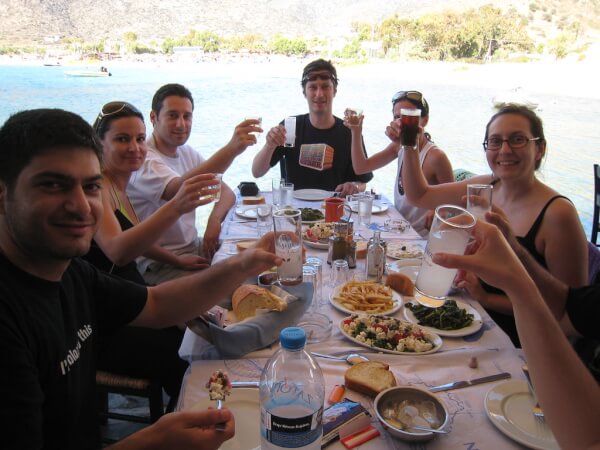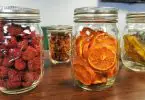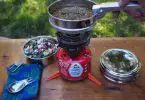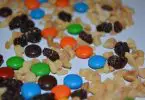For many backpackers, vegan backpacking food is an important factor to consider before setting off on hikes. Fortunately there is a wide variety of food choices to choose from and decisions are mostly based on duration of hike, weight of the food, convenience, storage, nutritional value and of course, taste.
See also: Dehydrated Food Recipes: Just Add Water to These Delicious Dehydrated Meals
Thanks to improvement in food technology and increasing awareness, vegan backpacking meals are more nutritious, tasty and varied than ever before. In this article, we were able to come up with food choices for breakfast, lunch, dinner, snacks, treats and condiments. These food choices are in no way exhaustive but only act as guides in making better vegan food choices.
Breakfast
Granola and Cereal
Vegan granola is an energy packed cereal consisting of rolled oats, fruits, nuts and plant based sugars like maple syrups and agave which substitute for honey. Prepacked granola is easy to prepare, and there are lots of varieties to give your day a boost.
You can add nuts like pecans, walnuts, hazelnuts and cashews to eat extra protein for sustained energy through out the day. Dried fruits like apple, mangoes and pineapple not only improve the taste but also add extra vitamins. Non dairy yoghurt or milk are not only delicious toppings but highly nutritious.
To increase protein content, you can add chopped nuts to your cereal. Cereals and granola make excellent breakfasts because they are high in fibre which causes fullness and satiety. They are also high in calories, which makes them perfect energy boosters to kick-start your day.
Dehydrated Milk
Pre-packed dehydrated milk are excellent backpacking food choices. They are also easy to prepare, since all you need is mix with water. Dehydrated milks also provide a significant bulk of daily protein intake. Powdered milk choices for vegans include: soy milk, almond milk, rice milk and potato milk.
They are available in powder form, which are packed in tins and containers. It’s good to remember that vegan milk doesn’t last as long as dairy milk. Remember to inspect the packaging, expiry date and buy from trusted brands. To get the most from vegan milk powders, store them in cool dry containers and protect them from moisture.
Bagel
Bagels are an all time favorite breakfast meal. They are rich in energy, packed with protein and can be dressed up for any occasion. There are lots of ways to eat a bagel: with nut spreads, fruit jams, fruit and vegetable slices, ketchup,mustard, fruit jerkies, vegan cheeses, hummus, tempeh, and just about any vegan food that can pass for a spread.
Like bread, bagels make good sandwich bases which could be eaten for breakfast, lunch and dinner. Freshly baked bagels last for about 1-3 days. It’s better to pack only the amount you can eat during these days. Anything more and the bagels could go bad and you will have to throw them out. Before heading out for your hike, you can do some research on the groceries that sell vegan food and bagels in the area.
Lunch and Dinner
Dehydrated Beans
Legumes are high in protein and fibre and animal free. Dehydrated beans are easy to store and prepare, they take only about 10-20 minutes to cook. They are also light, take up little space and easy to rehydrate for nutritious back packing meals.
You can dehydrate your beans at home or buy them canned. There are lots of beans varieties available: chickpeas, black beans, pinto beans, kidney beans, red beans, split beans, black eyed peas, navy beans, lentils, you name it.
There is more than enough variety of beans in different shapes, colours, taste and texture to cook tasty chillies, soups and stews. If you plan on dehydrating beans yourself, make sure they are properly cooked, dehydrated and stored in air tight containers or bags.
If you wish to use canned beans, inspect the can for puffiness, check the expiry date and store your cans in cool dark and dry places. Preheat all canned foods before eating.
Hummus
Hummus is a spread made from boiled and mashed chick peas and blended with olive oil, salt, garlic, lemon juice and tahini. Other bean varieties are used to substitute for chickpeas. Hummus is rich in protein and fibre which makes it a great choice for lunch and dinner.
It also gives satiety and wards off hunger for a long time, which is useful when you wish to hike long distances. Hummus can be home made or bought in stores. Which ever way you want it, be sure you store it in a cool dry place. Hummus is an excellent spread for bagel, biscuits and bread.
Dehydrated Soups
Just like dehydrated beans, dehydrated soups are light weight, easy to store and easy to cook. Soups can range from dehydrated vegetable mixes, to beans and mushrooms. Apart from preparing dehydrated soups yourself, you can also buy them from stores and groceries. These ones come in cans and unlike home made dehydrated soups, they have a longer shelf life.
Most of the canned soups come in chilli, Italian and curry seasonings. However you want it, be sure to inspect all canned soups for puffiness, leakiness and expiry dates. Store them properly, away from sunlight and moisture. And of course, eat all canned meals hot.
Prepared Meals
Prepared foods range from legumes to cereals to milk substitutes, casserole, puddings, pie, just about any meal you can think of. They are thoroughly cooked and frozen for preservation.
Must read: DIY Backpacking Food: An Organized Process That Will Make Your Excursion More Enjoyable
They are easy to prepare, just microwave to heat the meal and eat on the go. However since they are stored frozen, they may not be a likely choice for backpackers who trail to remote places.
However if you find one in a grocery store during your hikes, they make sumptuous meals, so long as they are eaten on time. There are lots of brands that serve vegan prepared meals in different taste and textures, just be sure to buy your meals from trusted brands. Of course inspect all food packs for puffiness, leakiness and expiry dates.
Boxed Meals
Boxed meals or recipe boxes are meal kit delivery services that contain pre-measured cooking ingredients and recipe all in a box. They are quick, convenient and minimize shortage by providing fixed portions for certain number of people. Also they encourage people to take the plunge by cooking new meals. Boxed meals might just be what you need for your next hike.
Just be sure to check the expiry dates and buy from trusted brands. There are lots of vegan boxed meals available, with varying recipes to please your taste buds.
Tortillas
Tortillas are thin, chewy, delicious and make convenient lunch or dinner. Like bagels they can be eaten in a variety of ways. They can be eaten with soups, stews, prepared meals, hummus, ketchups, mustard nut or fruit spread or as tacos with vegan fillings.
Anyway you like it, tortillas are filling, and offer a wide range of options to make your meals fun. Without refrigeration, tortillas last for about 5-7 days. To improve their shelf life, store in air tight containers, away from moisture and direct sunlight.
Rice and Pasta
A lot of hikers love packing rice because it is light and pretty easy to cook. Unlike legumes that take time and are best packed in cans or dehydrated, rice cooks easily. However, there are still dehydrated and canned rice available for those who want a quick meal on the trail.
There is also a handful of varieties available: long grain, short grain, basamatti, brown grain and fragrant grain. Rice can be eaten with soups, stews, legumes, mushrooms, vegetables and fruits.
They are energy dense, rich in fibre and when eaten with the right amount of side dishes, provide the amount of protein to give your day a lift. Store rice in air tight jars and bags, away from moisture and direct sunlight. Be sure to inspect all cans for leakiness, puffiness and expiry dates.
Pasta is another delicious energy giving food that is convenient for a hiker. It is easy to cook and served with a variety of side dishes: chilli, beans, fruits, nuts, vegetables, mushrooms, ketchup or mustard. Vegan pastas are egg free and are just as delicious and nutritious as their egg containing counter parts.
Tubers
Irish potatoes, sweet potatoes, and yams are delicious, energy giving and convenient. For fresh foods, they have a pretty long shelf life, about 2-3 weeks, as long as they are kept away from moisture and heat. They can be boiled or roasted and eaten with a variety of side dishes; beans, mushrooms and vegetables.
Snacks and Treats
Dried Fruits and Nuts
Dried fruits and nuts are light, convenient and packed with more than enough energy, protein and vitamins. You can make yours at home, using almonds, pecans, pretzels, raisins, hazelnuts and peanuts or buy prepacked fruits and nuts from a grocery store.
Dried fruits and nuts keep for about a month and their prepacked varieties keep for longer times. Just be sure to store both your homemade or prepacked treats away from heat, moisture and direct sunlight.
Chocolate
Good ole chocolate is a hiker’s best friend. Sweet, convenient and very nutritious, chocolate comes in handy every time. There are lots of vegan chocolate bars available, free from milk, egg and milk products and packed with more cacao and nuts.
Chocolates, particularly dark chocolates are rich in flavonoids and antioxidants that improve heart function and blood circulation. Store all chocolate bars away from direct sunlight to keep them from going soft and gooey.
Energy Bars
Energy bars are rich in cereals and other energy containing foods. They provide instant boost of energy for those who don’t have time to cook or when it’s inconvenient to cook.
Energy bars are made of granola, almonds, cashews, apricot, figs, berries, walnuts, apple, cinnamon, pomegranate, quinoa, oats, wheat, barley, and just about any cereal, nut and fruit to make them tasty.
Energy bars are convenient, light weight, easy to store and can be home made or bought prepacked from grocery stores. Prepacked energy bars last longer than their home made counterparts, but even the home made bars last for as long as two weeks. As long as you store them in cool, dry and airtight wraps or containers, your bars are likely to go all the way of your hiking.
Nut Butters
Nut butters are protein rich, convenient, and of course tasty. They make excellent spreads for bagels, bread, biscuits and tortillas. Peanut butter is the number one nut spread and it’s rich, creamy and filling. Other nut spreads include: almond butter, sunflower seed butter and cashew nut butter.
Apart from protein, nut spreads are rich in omega fatty acids, vitamin B complex and also carbohydrate. Although canned peanut butter have a longer shelf life, remember to check expiry dates before purchase. Store away from heat, moisture and direct sunlight.
Fruit Leather/Jerkies
Fruit jerkies are convenient tasty snacks made from dried pureed fruit. Apart from the taste, they are also packed with lots of vitamins A and C. Apples, plums, apricots, peaches, mangoes, bananas, raspberries and strawberries are just a few of the fruits that can be used. Fruit leathers can be home made or bought in grocery stores.
Homemade jerkies last for about a week, and should be stored in air tight ziploc bags to preserve its freshness. Prepacked fruit jerkies have a longer shelf life. However, don’t forget to examine and inspect packs for leakiness, expiry dates and fruit jerkies containing honey.
Vegan Marshmallows
Marshmallows are not only fun to eat, but also fun to prepare. Roasting them over the fire is a nice way to relax, tell stories and enjoy some outdoor scenery. Vegan marshmallows contain substitutes for animal based gelatin and taste just like conventional marshmallows, even better.
Whether home made or bought from a grocery store, marshmallows are light, convenient and can be eaten roasted, dipped in chocolate or eating right out of the pack. Marshmallows have pretty long shelf lives but be sure to store them in air tight bags, away from direct sunlight and moisture to keep them as long as possible.
Fruit Jams
Like fruit jerkies, fruit jams are tasty, nutritious and make awesome spreads for bread, bagels, biscuits and tortillas. They can also be eaten straight from the can. Fruit jams can be home made or bought from grocery stores.
Whichever way, they have long shelf lives and can keep for as much as a year if home made. Fruit jams provide a rich source of vitamins and instant energy. Store in air tight containers and keep away from moisture and direct sunlight.
Cookies
Vegan chocolate chips are tasty and nutritious energy giving snacks that are convenient and light weight. There are also lots of vegan cookies with good substitutes for animal based ingredients. Vegan cookies use cereals, nuts, grains, fruits and alternate milk as ingredients to make cookies that taste even better than their animal based counter parts.
Whether home made or prepacked, vegan cookies have long shelf lives. To improve preservation, store in air tight containers and keep away from moisture and heat.
Chips
Potato chips, tortilla chips, corn chips, Jalapeño chips and wheat snacks are just a few of the salted “junk food” to keep you on the go. They are high in calories, energy dense and quite salty. However they are lightweight snacks, handy and have really long shelf lives. Remember to inspect packs for expiry dates and store away from moisture.
Condiments
Spices
Spices improve texture, taste and colour of food. They are also rich in vitamins and minerals which are micronutrient that aid in food metabolism. Spices are usually ground into powder and stored in air tight bags or containers for longer shelf lives.
Spices are mostly plant based, and gotten from seeds, fruits, barks or roots. A couple of them include: cumin, paprika, cinnamon, nutmeg, fennel, garlic, ginger, mustard, thyme, turmeric, the list is endless.
Vegan Food Just Got Tastier!
There you have it, some of the best vegan food choices for hikers and backpackers. The general characteristics about these meals are their light weight, convenience, shelf life and nutritional value. Whether home made or prepacked in grocery stores, these meals provide the energy to keep you going on your hike.
They are just as tasty as their animal based counter parts, if not more, and come in a lot of variety to stimulate your taste buds. Remember to follow the storage instructions for each food, read labels on packs and cans and don’t be tempted to eat expired or spoiled foods. For more useful backpacking food tips, check our article for additional options.
Featured Image Source: “Greek Blooger Camp Food” by Titanas is licensed under CC BY-SA 2.0 https://www.flickr.com/photos/96437548@N00/530491588








